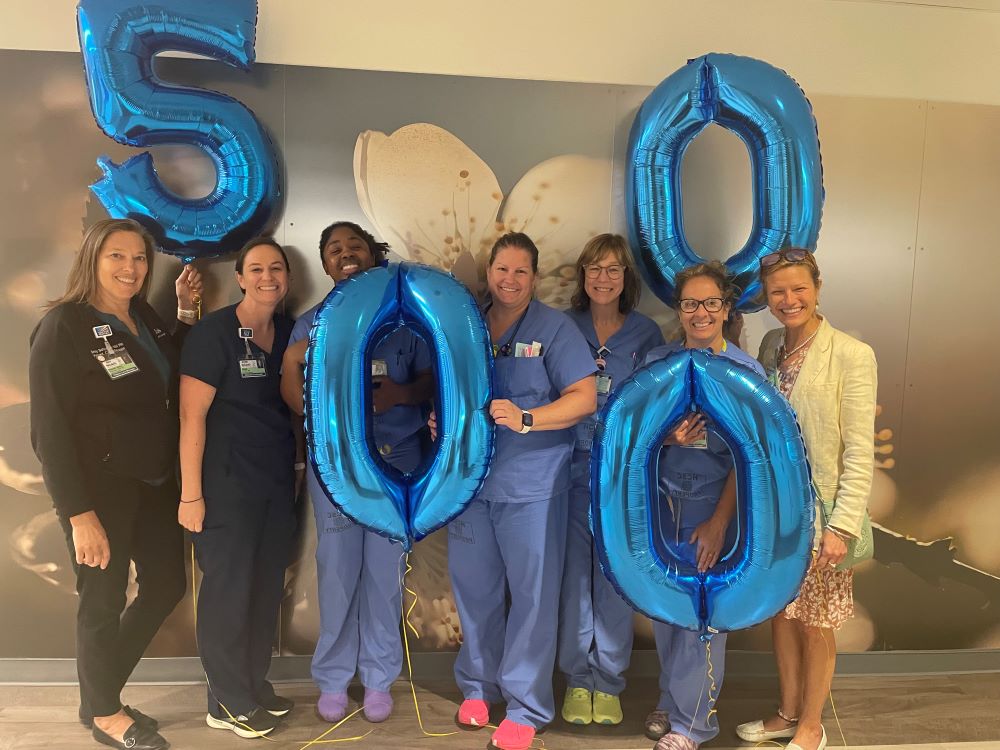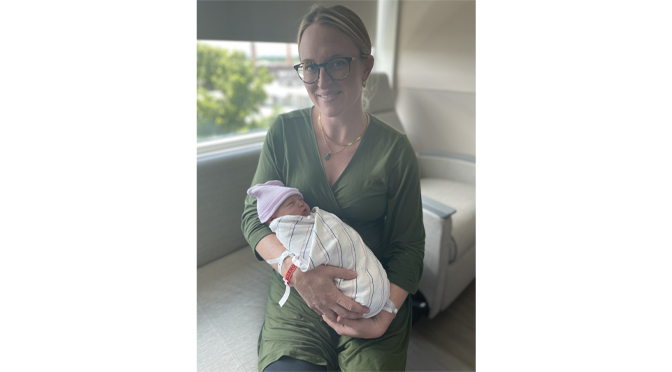

Featured image: Colette Hallard is the network’s 5,000th memberNumber The baby, Class of 2024, arrived at the new delivery room at St. Luke’s Allentown campus at 10:49 p.m. on June 26 with his mother, Ellen Hallar, of Kutztown.
While many Pennsylvania health systems have seen a downward trend in newborn births over the past five years, St. Luke’s University Health Network (SLUHN) is seeing the opposite trend, with more mothers than ever choosing St. Luke’s for their prenatal care and delivery.

For the first time in the network’s history, more than 5,000 babies were born in St. Luke’s three maternity hospitals combined during the fiscal year that ended June 30. That figure surpassed the 4,700 births total in fiscal year 2023, which was itself a record high.
“This major milestone reflects our patients’ trust and desire for the special care and expertise they experience in the delivery rooms at St. Luke’s Allentown, Anderson and Upper Bucks campuses,” said Elizabeth Dierking, MD, chair of the Department of Obstetrics and Gynecology.
Little Colette Hallar became the 5,000th baby when she arrived at the new delivery room at St. Luke’s Allentown campus at 10:49 p.m. on June 26. The baby, measuring 20 inches long and weighing 7 pounds, 11.5 ounces, is the daughter of Glenn and Ellen Hallar of Kutztown and is a sister to their daughter, Harper.
“We absolutely love St Luke’s,” Ellen said. “It’s a fantastic facility and the care is amazing and very professional.” Two more babies were born at the hospital on the same day.
Harper was born at another hospital, but the Harras chose to transfer her to St. Luke’s after hearing great things about the care there from friends.
“We were looking for something new, so this was a great experience,” said Ellen, who has vowed to return to St. Luke’s if she becomes pregnant with her third child.
According to https://www.health.pa.gov/topics/HealthStatistics/VitalStatistics/BirthStatistics/Pages/birth-statistics.aspx, hospitals in northeastern Pennsylvania, like the rest of Pennsylvania and the United States, are experiencing declining or plateauing birth rates.
According to usafacts.org, the U.S. birth rate is projected to decline through the remainder of the 21st century, from 10.8 per 1,000 in 2023 to 8.5 per 1,000 in 2100.
“This trend is happening throughout Pennsylvania and most of the country, but not at St. Luke’s,” Dierking added.
More babies are born at St. Luke’s than any other health system in the Lehigh Valley, and the network’s reputation for quality fetal, maternal and pediatric care has spread by word of mouth: The hospital was voted the best place to have a baby in a Morning Call reader poll.
In response to popular demand, the network opened a new, expanded birthing unit in the Women and Babies Pavilion on St. Luke’s Allentown campus earlier this year, doubling the size of the original unit. The first baby was born in this new facility on Valentine’s Day, and to date, 577 people have given birth here.
The addition of this new facility will increase the community’s access to quality birth, postpartum and newborn services, including neonatal intensive care.
St. Luke’s Hospital is investing in mothers, leading the region in opening a new birthing unit at the hospital and expanding other facilities and services focused on women’s health. In addition to the Women and Babies Pavilion in Allentown, St. Luke’s Hospital’s Upper Bucks campus will begin offering birthing services in 2022, following the lead of St. Luke’s Hospital’s Anderson campus, which launched a birthing program during the 2020 COVID pandemic.
“To increase our capacity to serve the needs of women of all ages and maintain our commitment to the community, St. Luke’s has invested $250 million in our women’s health facilities, programs and specialized staff,” said Nicole Nye, the network’s vice president of operations. In addition to opening three new women and baby pavilions at each hospital, the network has opened five new outpatient women’s health clinics in the region: two in Easton, two in Upper Bucks and the Valley’s only Spanish-only obstetrics and gynecology clinic in Allentown.
Since 2020, 15 new obstetrician-gynecologists have joined the network, with plans to hire five more within the next two years as demand for these specialists grows. The four-year obstetrics-gynecology residency trains 24 new physicians each year at the Allentown and Anderson campuses.
Pregnant women and couples are attracted to St. Luke’s for prenatal care and birth because our small, intimate practice and care team offers the personalized care patients want, including the same doctor/team following you through pregnancy and birth – a convenience that most other hospitals do not offer/guarantee for their pregnant patients.
“Our patients tell us they choose St. Luke’s providers/clinics for the convenience and quality during their pregnancy and birth, which is not common at most other networks,” says Dr. Dierking. St. Luke’s “Baby and Me” programs are offered at all three campuses, providing highly personalized prenatal and postpartum care, as well as lactation education and support, behavioral health care and expertise in high-risk pregnancies. All labor and delivery units offer 24/7 neonatal services, providing the highest level of advanced care for complex pregnancies and births and critically ill babies.
In May, the Labor and Delivery Unit and Obstetric Anesthesia Service at St. Luke’s Hospital Anderson Campus was designated the third Center of Excellence (COE) in Pennsylvania (and the first in the Valley) by the Society of Obstetric Anesthesia and Perinatology, placing it on par with national organizations as a premier institution providing the highest level of safe, effective anesthesia care for women and their fetuses.
Information provided to TVL:
Sam Kennedy
https://www.slhn.org/

